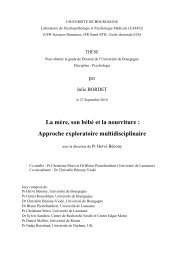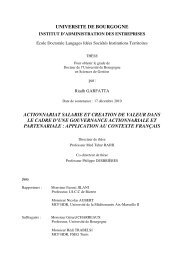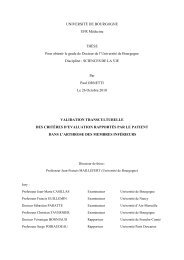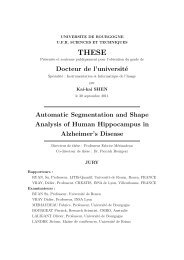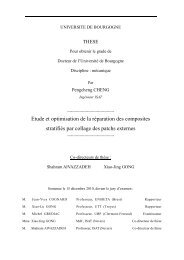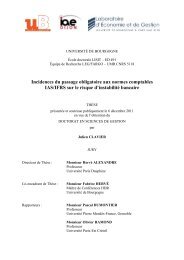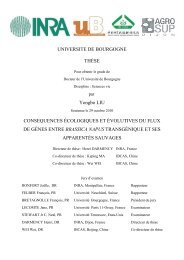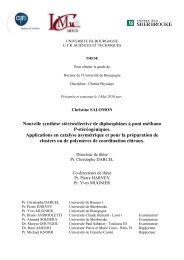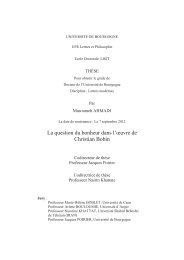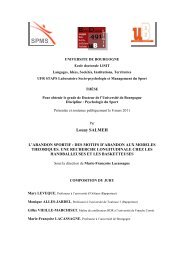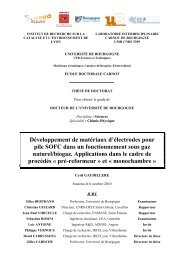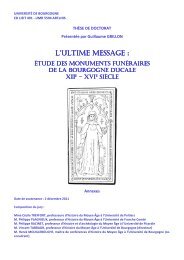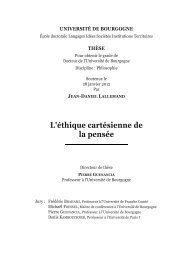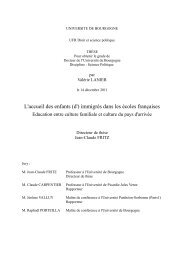Higher education in Asian countries and the role of international ...
Higher education in Asian countries and the role of international ...
Higher education in Asian countries and the role of international ...
You also want an ePaper? Increase the reach of your titles
YUMPU automatically turns print PDFs into web optimized ePapers that Google loves.
183<br />
documents belongs to <strong>the</strong>se categories: Education at a Glance, PISA, OECD Education Statistics,<br />
Reviews <strong>of</strong> National Education Policies, Teach<strong>in</strong>g <strong>and</strong> Learn<strong>in</strong>g International Survey (TALIS),<br />
<strong>and</strong> <strong>Higher</strong> Education Management <strong>and</strong> Policy. OECD directorate for <strong>education</strong> is responsible<br />
for <strong>the</strong> production <strong>of</strong> <strong>education</strong> related documents <strong>and</strong> publication, which covers a wide variety<br />
<strong>of</strong> subject. These publications on <strong>education</strong> help <strong>the</strong> member <strong>and</strong> non-member <strong>countries</strong> to have<br />
better underst<strong>and</strong><strong>in</strong>g <strong>of</strong> <strong>the</strong> shared problems, new challenges faced by <strong>the</strong> <strong>education</strong> sector <strong>and</strong><br />
viable solutions available to <strong>the</strong>m. These documents also give opportunities to make <strong>in</strong>ter-<br />
<strong>countries</strong> <strong>and</strong> <strong>in</strong>ter-regions comparisons <strong>and</strong> allow <strong>the</strong> actors to learn from each o<strong>the</strong>r. The<br />
OECD, through its publications <strong>and</strong> activities <strong>in</strong> Asia, has cleared <strong>the</strong> way “for greater<br />
convergence <strong>and</strong> commitment amongst <strong>Asian</strong> states to adopt uniform models <strong>of</strong> best practices at<br />
higher <strong>education</strong> level” (Yang, 2010).<br />
On <strong>Asian</strong> partner economies, s<strong>in</strong>ce year 2000 OECD‟s Directorate for Education has produced<br />
123 reviews <strong>and</strong> surveys, 25 reports <strong>and</strong> 50 publications. The detailed data reveals that 80% <strong>of</strong><br />
<strong>the</strong> documents produced were on four <strong>Asian</strong> member economies while only 20% were on <strong>the</strong><br />
rema<strong>in</strong><strong>in</strong>g seventeen <strong>Asian</strong> partner <strong>countries</strong>. Among <strong>the</strong>se partner on five <strong>countries</strong> Bahra<strong>in</strong>,<br />
Bangladesh, Iran, Saudi Arabia <strong>and</strong> Vietnam OECD Directorate for Education has not produced<br />
even a s<strong>in</strong>gle document while sixteen <strong>countries</strong> are without any report <strong>and</strong> n<strong>in</strong>e <strong>countries</strong> are<br />
without any presence on publication table. (see <strong>the</strong> table)<br />
5.2.11.1.2 OECD data <strong>and</strong> <strong>Asian</strong> <strong>countries</strong><br />
OECD to stay <strong>in</strong>formed <strong>and</strong> to keep <strong>the</strong> world <strong>in</strong>formed collects, analyses <strong>and</strong> present <strong>the</strong> data<br />
on its member <strong>and</strong> some <strong>of</strong> <strong>the</strong> non- member <strong>countries</strong> <strong>in</strong> <strong>the</strong> field <strong>of</strong> <strong>education</strong> <strong>and</strong> o<strong>the</strong>r fields.<br />
OECD ga<strong>the</strong>rs <strong>and</strong> compiles <strong>in</strong>formation on high-<strong>in</strong>come <strong>countries</strong> but little or no <strong>in</strong>formation<br />
on low-<strong>in</strong>come <strong>countries</strong> (LICs) <strong>and</strong> middle-<strong>in</strong>come <strong>countries</strong> (MICs) (Olsson & Mk<strong>and</strong>awire,<br />
2009). Likewise on majority <strong>of</strong> <strong>the</strong> <strong>Asian</strong> <strong>countries</strong> much data do not available with OECD.<br />
A repository <strong>of</strong> <strong>in</strong>formation on low- <strong>and</strong> middle-<strong>in</strong>come <strong>countries</strong> which, toge<strong>the</strong>r with <strong>the</strong><br />
<strong>in</strong>formation available on OECD Member <strong>countries</strong>, can serve as a genu<strong>in</strong>e knowledge bank on<br />
global knowledge systems (Olsson & Mk<strong>and</strong>awire, 2009). Because detailed data on <strong>education</strong><br />
helps all stakeholders to have a better underst<strong>and</strong><strong>in</strong>g <strong>of</strong> <strong>the</strong> situation <strong>and</strong> multi-dimensional<br />
comparisons that fur<strong>the</strong>r enrich <strong>the</strong>ir experiences <strong>and</strong> help <strong>in</strong> policy fram<strong>in</strong>g, <strong>in</strong>formed decisions<br />
<strong>and</strong> research. The OECD has three types <strong>of</strong> databases:



